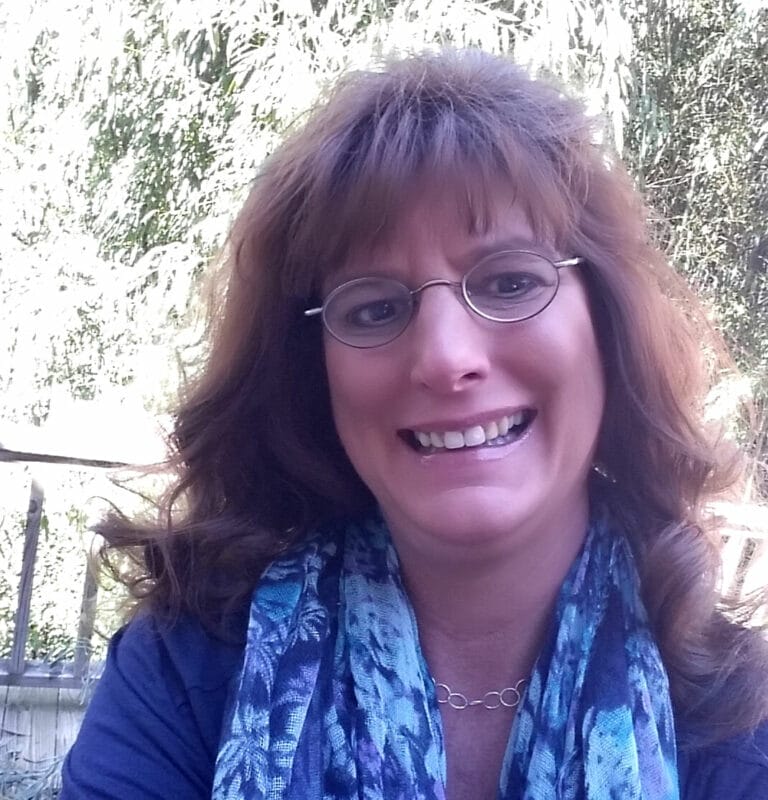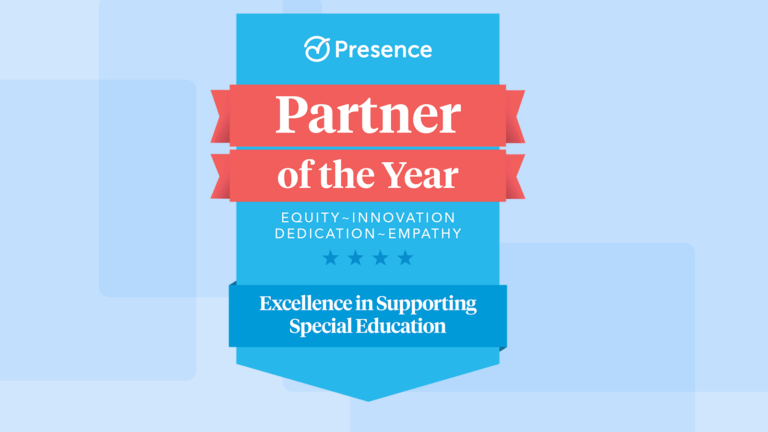
School psychologist Lynn W. attended the University of South Florida in Tampa where she received her BA in Psychology, and her MA and EdS in School Psychology. She started practicing as a school psychologist in 1992, and began working virtually in 2012, transitioning to teletherapy with PresenceLearning in 2015.
Can you give us some fun facts about yourself to start out?
I grew up in Rye, New York on the New York/Connecticut border. The next town over is Port Chester and then the Connecticut line. The lifesaver candy factory was in Port Chester and you could always tell what flavor of lifesaver they were making by the smell in the air.
In my free time, I like to get out in nature. I love to visit Gatlinburg which is about an hour from here. Great Smoky Mountain National Park is about 30 minutes from me. Every chance I get I go there. I’ve seen four bears this year (from my car) which is a record for me. At home, I feed the birds and like to watch them and the squirrels argue over the bird food. My son just had a little boy in June 2020 so I like to spend time with them—they live nearby. My grandson is the love of my life.
Here’s a fun fact about my graduate program—when I started, Dr. Howie Knoff was the department chair and head of the school psychology program. He was the president of the National Association of School Psychologists. Dr. Knoff is known for his work with Project Achieve and the Stop and Think Social Skills Program. My second year in the program, George Batsche joined our faculty and he was the president of the National Association of School Psychologists. (George Batsche, PhD, NCSP, is respected as a pioneer in the field of school psychology).
So, I graduated from the fifth top program in the US. Today we use RTI (Response to Intervention) to look at children for eligibility—we have to go through a series of interventions either academically and/or behaviorally to try to determine if the child will respond to an intervention before moving on to testing for a possible special education placement. When I graduated, we were using the same strategies through the RQC (Referral Question Consultation) model. I was trained in RQC in my school psychology program so it’s second nature for me to think that way.
How did your practice change during the COVID-19 crisis? Did you transition to working in homes?
I lost my counseling students because my two schools that had been doing counseling chose not to continue counseling online when the students were home. I was in very rural schools in the south when the pandemic started. I think the district chose to not do counseling in the homes due to varying internet access issues. So l lost my counseling students and picked up a lot more evaluations. That’s when I learned how to train the parents on what the expectations were going to be because we made a few mistakes in the beginning. We all learned together about how to set the scene for success.
How has this transition been for you and for your students and their families? It would be good to know what some of the challenges have been and how you’ve worked through those challenges, when applicable.
Last school year and the beginning of this year have been an interesting and challenging time for educators, students, and parents. It has been very gratifying to be able to support school districts, parents, and students as education has moved from the brick-and-mortar setting into the virtual setting. The districts that I served last year made decisions to continue to provide virtual psychological evaluation services in the home setting. This required a new approach, as my Primary Support Person changed from a district employee to the child’s parent. I found it very helpful to have a detailed conversation with the parent prior to the first testing session to explain how the sessions would work and what their role would be. The parents asked lots of great questions which allowed me to change my descriptions of services and expectations as I learned with them how this new role would evolve.
Can you share some of the questions parents asked?
Parents asked questions like “Do I have to sit right there with the child?” I’m testing preschool through high school online so I tell them “With the little ones, yes, with the older ones, generally, no.” That’s a very specific kind of question. They all want to know: What’s my role? What do I do? How long will this take? That’s why I now meet with them for a few minutes before we ever have our first session to define their role.
I explain the process and their role in it. Here’s an example of what I say:
“You’ll log in. I’ll introduce myself to you and your child before we put headphones on so that we can do the testing. We’ll just use the sound through speakers on the computer initially so I can introduce myself to you and your child, and ask the introductory student interview-type questions, especially if the child is younger and has some kind of speech impediment so I can get used to their speech and if necessary, you, the parent, can let me know what she’s trying to say or clarify that this is what he said.” This will help me to learn the pattern of articulation errors so I can better identify what I am hearing. Our conversation will also help me to understand their frustration tolerance, and how supportive I need to be with them. For example, do I need to encourage a lot or do I need to pull back a little? If I encourage them too much, is that going to slow them down? This meeting lets me feel the family and the child out in that respect.
And I can field questions like “What happens next? After all this testing, now what happens?” I can explain that in some schools I am at the eligibility meeting. In some schools I am not. So I have to tailor the discussion about my followup to something like this:
I’ll score everything. I’ll write my report. Either the school will be in touch and they will meet with you, or I’ll be in touch and will set up a meeting time with the school. We’ll go over all the test results and then we’ll talk about whether your child is eligible for special education or not.
How have you been helping parents and caregivers who are now acting as the Primary Support Person with their child?
In addition to having a detailed discussion of their role during testing or counseling sessions, I also provide them with two documents: The Parent Tips and Tricks for Online Psychological Assessment and the Equipment Setup Guide developed by PresenceLearning for their providers. These documents help to facilitate the parent’s understanding of the process of completing a virtual evaluation and clearly outline how to set up the necessary equipment.
What age range/student population are you currently serving? Please include demographic information.
I work for two brick-and-mortar districts in Tennessee, for which I serve children from 3–22 years of age. I am also working for two virtual schools in Pennsylvania and have served children from 5–18 years of age.
Working for PresenceLearning has been wonderful because when you are a brick-and-mortar psychologist, you get to do very little, if any, counseling so that was part of the role that I really enjoyed. My first year with PL, I did some social skills groups, using Howard Knoff’s Stop and Think curriculum which I was trained on when I was in graduate school. I had two separate districts in Mississippi and I worked with both of them on the Stop and Think curriculum and then I did some counseling in Georgia and North Carolina and in Mississippi for a third district. So my first year with PL was basically all counseling which was a huge role change for me. And then my second year we got into the psychological testing so then it was a split between counseling and testing. This is the first year that I haven’t had any counseling. It’s been all testing because we’ve had such a need and a request for testing. And that’s where school psychologists are unique. We can do testing where the school social workers, the licensed professional counselors, the other folks that PL has for behavioral and mental health can fulfill the role of counseling. The testing niche is unique to school psychologists. They can’t have other people doing it. While I am not doing counseling at this time, I am doing a lot more testing and I’m a lot busier than I used to be, honestly. I am enjoying what I am doing now—this is what I was trained to do.
What advice would you give districts considering online therapy?
The services can be provided and can be provided as validly and as reliably as if I am sitting across the table from a child. Sometimes, it actually is a better situation. For example, for students diagnosed with an autism spectrum disorder or ADHD, the children are less distracted when interacting with me through the computer. They are more engaged. I have run across very few students who could not be tested online in my five years with PresenceLearning. There may have been maybe two or three that we had to back up and do something a different way. But I have not encountered a high percentage of children who couldn’t receive services through teletherapy. They seem to really enjoy it. The kids will ask me, “Where do you live?” So I’ll tell them a little about me. Or they’ll see the dog or the cat walk behind me and they’ll say, “Oh my gosh. Was that a dog? Was that a cat?” So I’ll pick the animal up and hold the animal up for their minute of fame on the computer and that creates a whole different level of rapport with the child when they get to see Shadow, the Chihuahua, or Tigger, my silver tabby cat. The children really seem to enjoy that! It gives them a different kind of rapport with me because now I’m not just some teacher who came to see them at school. I’m a person. I believe they like that personal connection that we can make that way.
That would be my biggest piece of advice. Ninety-nine percent of students can and do enjoy telehealth, and even being evaluated online. I feel that I can make a deeper personal connection with the students when I’m sitting at home and they can see my pets, or my son who just walked by and understand that Miss Lynn is a person too who has pets and other family members, just like they do.
Are you in need of related service providers like Lynn? PresenceLearning is here to help! Schedule a consultation today!



